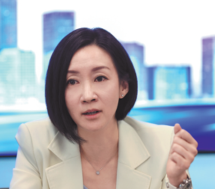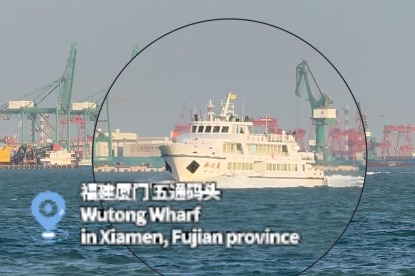Audi strengthens position in China with momentous product rollout

German carmaker Audi is confident in China, with a comprehensive strategy in place to sharpen its competitive edge in the world's largest vehicle market, said Audi China President Johannes Roscheck.
"Our confidence in and dedication to the Chinese market remain unchanged; this has been true in the past, holds true in the present, and will continue to be true in the future," said Roscheck in an interview with China Daily in late September.
The Chinese automotive market is a powerhouse in the global industry, with sales expected to reach around 25 million vehicles in 2024.
This immense demand is driven by a burgeoning middle class and a growing interest in electric vehicles, which are projected to make up a significant portion of future vehicle sales.
They are already serious choices in China. Last year, NEV sales in China soared to over 9.5 million units, up 37.9 percent year-on-year.
The rise of NEVs to stardom as well as changing consumer preferences have left many gasoline models stranded, forcing carmakers to cut their prices to win customers.
This dynamic and highly competitive environment in the Chinese market presents both opportunities and challenges for established brands like Audi.
Audi has decided to be the maverick, charting a different course by prioritizing sustainable, high-quality growth, in the industry often focused on short-term gains.
"While it is crucial to maintain market competitiveness, we are equally committed to long-term, sustainable development," Roscheck said.
He emphasized that Audi will not engage in unsustainable price wars, preferring instead to focus on delivering exceptional quality and innovation that aligns with the brand's values.
Amid the rapid changes in the market, Roscheck emphasized the word "focus". "To succeed in China, we must focus on three key areas: the Chinese market, products, and brand identity," he explained.
"China is a unique market, and our focus on the Chinese market, products, and brand identity will guide us toward continued success," he said, reinforcing Audi's commitment to delivering exceptional value to its customers.
Among other things, Audi is set to launch its largest-ever product initiative in the coming two years.
This monumental plan includes upgrading all models and introducing a new generation of vehicles specifically tailored to meet the diverse demands of Chinese consumers.
"We are not just launching new models; we are redefining the Audi experience for our customers in China," Roscheck said, highlighting the brand's focus on innovation and quality.
Katy Tsang, executive vice-president of sales and marketing at Audi China, said the new product lineup will not only elevate Audi's brand presence in China but reflect its understanding of the unique needs of Chinese consumers.
"We are excited to bring innovative solutions that resonate with our customers," said Tsang, emphasizing that the new offerings are designed to enhance the premium experiences that Audi is known for while integrating modern technological advancements.
Audi's forthcoming electric vehicles, including the Q4 e-tron and Q5 e-tron, are set to play a crucial role in this expansion, reflecting the brand's commitment to sustainable mobility.
At the same time, Audi will continue to invest in its combustion-engine products, ensuring that models like the A6L and Q5L remain competitive.
This balanced approach to product development positions Audi as a versatile leader in the premium automotive market.
"Every new product we launch will not only meet but exceed the expectations of our customers," Roscheck said, reiterating Audi's commitment to innovation and excellence.
Also, he noted that maintaining a strong brand identity is essential. "Audi's DNA, rooted in premium experiences and performance, remains unchanged," he said.
Based on its DNA, the brand is evolving to resonate with younger, tech-savvy consumers who seek a deeper connection with the products they purchase.
Audi is harnessing its two-partner strategy with FAW and SAIC as a foundation for its growth in China, which Roscheck described as instrumental in enhancing Audi's local presence and product offerings.
"By leveraging the strengths of our partners, we can deliver vehicles that resonate with Chinese consumers while maintaining our brand identity," he said.
With FAW, Audi celebrates over 36 years of collaboration, marked by the introduction of numerous models tailored to the unique preferences of Chinese drivers.
In recent months, Audi has also strengthened its partnership with SAIC to develop innovative vehicles that cater to China's fast-evolving NEV market.
Earlier this year, Audi signed a significant agreement with SAIC to jointly develop the Advanced Digitized Platform, designed to accelerate the integration of cutting-edge technology into new co-developed vehicles to enhance their appeal in the competitive market, while giving Audi's authentic DNA a fresh and youthful expression in the Chinese market.
In line with its commitment to open innovation, Audi has forged partnerships with leading Chinese technology companies such as Huawei and Tencent.
"Our goal is to incorporate the latest technological advancements into our vehicles while staying true to the Audi brand," Roscheck explained.
These collaborations will enable Audi to stay ahead in the competitive landscape, particularly in areas such as smart connectivity and intelligent driving, which are becoming increasingly important to consumers in China.



Today's Top News
- Lai's 'separatist fallacy' speech rightly slammed
- Xi's message for New Year widely lauded
- Swiss bar fire kills around 40, injures more than 110
- New Year's address inspiring for all
- Xi congratulates Science and Technology Daily on its 40th anniversary
- Xi congratulates Guy Parmelin on assuming Swiss presidency






























